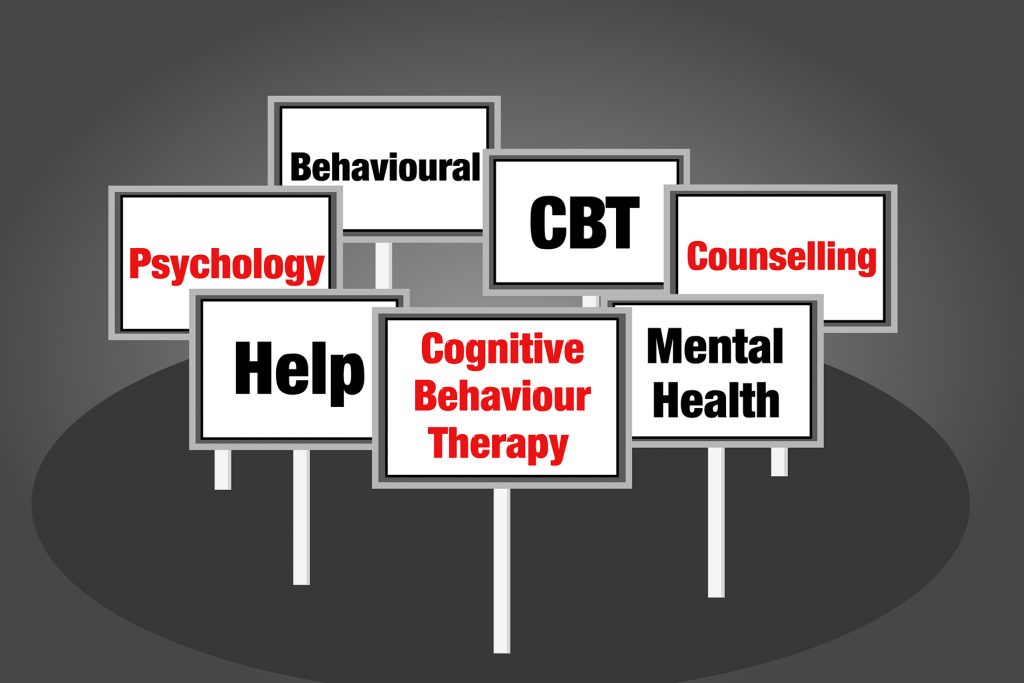Psychiatry
Cognitive Behaviour Therapy (CBT)
Information about Cognitive behaviour therapy
CBT is a type of talking therapy. It’s a combination of cognitive therapy, which helps with your thinking processes, and behavioural therapy, which focuses on your behaviour in response to those thoughts.
Common CBT techniques include:
- challenging negative beliefs and replacing them with alternative ones
- problem solving
- developing coping skills
CBT is a short-term treatment that usually lasts between six weeks and six months. It consists of individual treatment sessions, which you will usually attend every week and at times a few times a week as per need of the patient. Occasionally, group sessions are available as well. The number of sessions you have will depend on your condition and commitment to the treatment. Each session usually lasts for about half an hour to one hour.
CBT is most often used to treat anxiety disorders or depression. However, it can also be used to treat:
- panic disorders
- eating disorder
- obsessive-compulsive disorder (OCD)
- bipolar disorder with medications
- phobias
- stress
- post-traumatic stress disorder
- schizophrenia with medication
- sanger issues
- sleep problems
- body dysmorphic disorder
- persistent pain
- sexual or relationship issues
CBT is sometimes given together with medication for anxiety disorders, moderate to severe depression and attention deficit hyperactivity disorder (ADHD).
What happens during CBT?
To start with, your CBT practitioner will ask about your background and how you are currently feeling. He or she will work with you to identify problem areas and you will decide which areas you would like to deal with.
You will learn to make sense of your problems by breaking them down into smaller areas so that you can see how they are connected and how they affect you.
Using structured techniques, your CBT practitioner will try to identify how you are thinking and how this can cause problematic feelings and behaviours. You will learn to challenge negative ways of thinking, and how to react more positively. This can lead to behavioural changes that may make you feel better.
You will usually be asked to keep a diary so that you can identify how you react to certain events. This will help you to identify patterns of thoughts, emotions, physical feelings and actions, and see if they are unrealistic or unhelpful.
Your CBT practitioner will usually set you homework assignments. This may include reading material, tasks where you can test and practice the techniques you learn, or gradually exposing yourself to situations you’re afraid of. Your CBT practitioner may ask you to practice replacing negative thoughts with positive ones during everyday events. This isn’t always easy, but by using CBT techniques you can try out different behavioural approaches in real situations, which can help you to make changes. You won’t be asked to do anything that you don’t feel comfortable with.
CBT aims to provide you with the insight and skills to improve your quality of life. Once therapy has finished, you will be able to practice what you have learnt and continue on your own.
Is CBT effective?
Research suggests that CBT is effective at reducing the symptoms of anxiety disorders and mild to moderate depression. It may also help to reduce your risk of getting these conditions again (relapse). It has also been used effectively in other conditions as well.
Deciding on CBT treatment
Treatment can be challenging and you must want to actively change your thoughts and behaviour for it to be successful. You will need to be open, persistent and brave when undergoing CBT and you may have to deal with difficult emotions such as anger, guilt and shame. The success of CBT depends on your active participation and commitment to the process.
How well does cognitive behavioural therapy work?
CBT has been shown in clinical trials to help ease symptoms of various health problems. For example, research studies have shown that a course of CBT is just as likely to be effective as medication in treating depression and certain anxiety disorders. There may be long-term benefits of CBT, as the techniques to combat these problems can be used for the rest of your life to help to keep symptoms away. So, for example, depression or anxiety are less likely to recur in the future. There is good research evidence too to show that CBT can help to improve symptoms of some physical conditions such as rheumatoid arthritis.
What is the difference between cognitive behavioural therapy and other talking treatments?
CBT is one type of psychotherapy (talking treatment). Unlike other types of psychotherapy it does not involve talking freely, or dwell on events in your past to gain insight into your emotional state of mind. It is not a “lie on the couch and tell all” type of therapy.
CBT tends to deal with the here and now – how your current thoughts and behaviours are affecting you now. It recognizes that events in your past have shaped the way that you currently think and behave. In particular, thought patterns and behaviours learned in childhood, However, CBT does not dwell on the past, but aims to find solutions to how to change your current thoughts and behaviours so that you can function better now and in the future.
CBT is also different to counseling, which is meant to be non-directive, empathetic and supportive. Although the CBT therapist will offer support and empathy, the therapy has a structure, is problem-focused and practical.
What are the limitations of cognitive behavioural therapy?
CBT does not suit everyone and it is not helpful for all conditions. You need to be committed and persistent in tackling and improving your health problem with the help of the therapist. It can be hard work. The homework may be difficult and challenging. You may be taken ‘out of your comfort zone’ when tackling situations which cause anxiety or distress. However, many people have greatly benefited from a course of CBT.
CBT duration and charges
Total number of sessions: 12-15 sessions approximately
Duration: 30mins to 45 mins/ session
Process includes
6-8 sessions (approximately) —- techniques to change cognitions
6 sessions (approximately) —– Biofeedback plus relaxation therapy
One session —- virtual reality relaxation session
Material given:
One audio CD for Relaxation
Medical Specialists
Dr. Vijayakumar D.R
Dr. Vijayakumar D.R is a senior psychiatrist with more than 22 years of experience in handling mental health issues in India, Australia and the United Kingdom.
Dr. Madhu Shree Vijayakumar
Dr. Madhu Shree Vijayakumar, is an obstetrician and gynaecologist with about a decade experience in addressing women’s health problems from adolescence to post menopause.
- cognitive behaviour therapy
- cognitive behavioral therapy examples
- cognitive behavioral therapy techniques
- cognitive behavioral therapy exercises
- cognitive behavioral therapy for anxiety
- cognitive behavioral therapy pdf
- cognitive behavioral therapy online
- cognitive behavioral therapy worksheets
- cognitive therapy
- cognitive behavioral therapy near me
- cognitive behaviour therapy ppt
- cognitive behaviour therapy meaning
- cognitive behaviour therapy pdf
- cognitive behaviour therapy is used in
- cognitive behaviour therapy for depression
- cognitive behavioral therapy at home
- the cognitive behaviour therapy
- a cognitive behavioral therapy
- the cognitive behavior therapy center
- cognitive and behavioral therapy techniques
- cognitive behavioral therapy bangalore
- a b c model in cognitive behaviour therapy
- abc model in cognitive behavioural therapy
- abc model in cognitive behavioral therapy
- abc model of cognitive behavioural therapy
- the abc model of cognitive behavioral therapy
- cognitive behaviour therapy course
- cognitive behaviour therapy case studies
- cognitive behaviour therapy bangalore
- cognitive behaviour therapy certificate
- cognitive behavioral therapy
- cognitive behavioral therapy definition
- cognitive behavioral therapy dataset
- cognitive behavioral therapy duration
- cognitive behavioral therapy doctors
- cognitive behavioral therapy doctors near me
- cognitive behaviour therapy depression
- cognitive behaviour therapy enhanced
- cognitive behaviour therapy karnataka
- cognitive behavioural therapy eating disorders
- e cognitive behavioural therapy
- cognitive behaviour therapy for ocd
- cognitive behaviour therapy for psychiatric problems
- cognitive behaviour therapy for anxiety
- cognitive behaviour therapy for autism
- cognitive behaviour therapy for insomnia
- cognitive behavioural group therapy
- cognitive behaviour therapy game
- cognitive behavioral therapy homework
- cognitive behavioral therapy how to
- cognitive behaviour therapy introduction
- cognitive behavioral therapy in bangalore
- cognitive behavioral therapy in kannada
- cognitive behavioral therapy is used for
- cognitive behavioral therapy in india
- cbt therapy for insomnia
- cbt for insomnia
- cognitive behaviour therapy limitations
- cognitive behavioural therapy
- cognitive behavioral therapy meaning
- cognitive behavioral therapy methods
- cognitive behaviour therapy near me
- cognitive behavioral therapy notes
- cognitive behaviour therapy online
- cognitive behaviour therapy online course
- cognitive behaviour therapy online fee
- cognitive behaviour therapy online bangalore
- cognitive behavioral therapy ocd
- cognitive behaviour therapy online karnataka
- master of cognitive behaviour therapy
- types of cognitive behaviour therapy
- cognitive behavioral therapy questions
- cognitive behaviour therapy qualifications
- cognitive behavioral therapy quiz
- cognitive behavioral therapy reviews
- cognitive behavioral therapy research
- cognitive behavioral therapy resources
- cognitive behavioral therapy steps
- cognitive behavioral therapy strategies
- what is cognitive-behavioural therapy
- what is cognitive behavioural therapy
- cognitive behavioral therapy test
- cognitive behavioral therapy treatment
- cognitive behavioral therapy types
- cognitive behavioral therapy techniques for retraining your brain
- cognitive behaviour therapy updates
- cognitive behaviour therapy videos
- cognitive behaviour therapy values
- cognitive behaviour therapy what is it
- cognitive behaviour therapy workshops
- cognitive behaviour therapy youtube
- cognitive behavioral therapy in depression
- depression and cognitive behavioral therapy
- cognitive behavioral therapy for depression
- cognitive behavioral therapy 2020
- cognitive behavioral therapy 2021
- cognitive behavioural therapy strategies
- cognitive for behavioral therapy
- cognitive behavioral therapy for insomnia
- cognitive behavioral therapy application
- the cognitive behavioral therapy center
- cognitive and behavioral therapy near me
- cognitive and behavioral therapy for anxiety
- cognitive behavioral therapy cost
- cognitive behavioral therapy cbt
- cognitive behavioral therapy depression
- cognitive behavioral therapy effectiveness
- cognitive behavioral therapy explained
- cognitive behavioral therapy for ocd
- cognitive behavioral therapy for alcoholism
- cognitive behavioral therapy for kids
- cognitive behavioral therapy for social anxiety
- cognitive behavioral therapy given by
- cognitive behavioral therapy how it works
- cognitive behavioral therapy images
- cognitive behavioral therapy in psychology
- cognitive behavioral therapy in ocd
- cognitive behavioral therapy key concepts
- cognitive behavioral therapy online india
- cognitive behavioral therapy psychology
- cognitive behavioral therapy process
- cognitive behavioral therapy price
WhatsApp us



